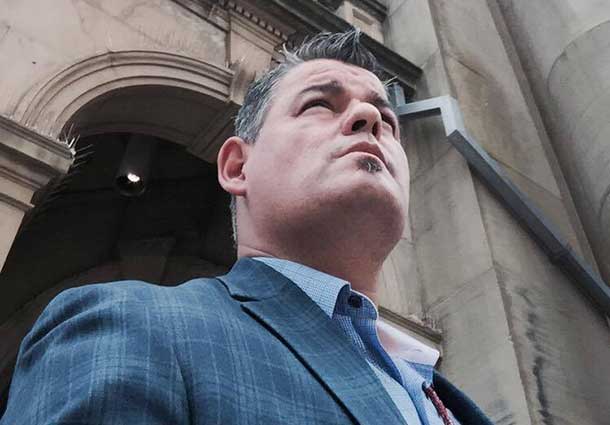TORONTO – Over 300 First Nation leaders and economic development officers are gathering with government and industry this week at the Ontario First Nation Economic Forum (OFNEF), October 12-13 in Toronto.
The two-day event features a sold-out tradeshow and keynote speakers such as Chief Clarence Louie, Chair of the National Aboriginal Economic Development Board (NAEBD); Gary Davis, former CEO of the National Center for American Indian Enterprise Development (NCAIED) and newly appointed Executive Director of the Native American Financial Services Association; and Ted Nolan, former NHL coach and entrepreneur.
Ontario First Nation Economic Forum
Toronto, Ontario
October 12-13
Good Morning — from the #BigSmoke. Here at the Ontario First Nation Economic Forum. We are going to hear many success stories; we will listen to some leading economic experts and views from “who’s who” in the First Nation Economic world.
I first of all thank our organizers and chiefs who hold this important portfolio. I want to thank all of those people who are coming to talk about this most important matter.
This is such a vital discussion – – it is more than money, status, or material wealth — to First Nations, the economy is about life and death – – it’s about poverty or quality of life — it’s about being able to feed your children or having them taken away.
As I woke this morning quite thoughtful about today — I look at where I woke up; what comforts I have around me — and I’m not convinced we are talking about all of what’s critical in the #EconomicDiscussion. Let’s take for example the fact that we are on a very sacred land where First Nations have historically traded, gathered, occupied and co-existed —- as proud, strong and sovereign nations; that is until the ink dried on the pre-confederate treaties within what is now known as the GTA The Greater Toronto Area. Who controls the economy here on this sacred treaty territory??
We must factor more into this discussion and set the right dialogue on what needs to be our focus — “First Nation” economy and its reality is not an easy discussion because of the gap and its impacts. #Economic justice is a perspective that we must not lose as we open up today’s sessions — let’s set in place the starting point position as to what the First Nation economic reality is for our People in this city, province and in Canada.
We look around at the economic discussion here today — this is what comes to mind; this is a bit of what I read this morning – this is the reality that I contemplate this morning:
TORONTO ECONOMIC REALITY
Toronto is Canada’s financial and business capital.
Rated as one of the top four global cities with economic clout (Cities of Opportunities Report, PwC, 2014), and topped the North American Cities of the Future, fDi, behind only New York, Toronto is a dynamic, diverse, rising city that provides the ideal business environment for companies looking for a competitive edge.
With 2.8 million residents, Toronto is the fourth largest city in North America
One-quarter of Canada’s population is located within 160 km (100 miles) of the city and more than 60 per cent of the population of the USA is within a 90-minute flight
Toronto is one of the most livable and competitive cities in the world as demonstrated by various international rankings and reports
Toronto’s more than 89,800 businesses choose from a large, highly skilled, multilingual workforce of 1.4 million people – one sixth of the country’s workforce.
FIRST NATION ECONOMIC REALITY
The economic situation of Canada’s aboriginal people is worsening and First Nations are “not on track to achieving parity with non-aboriginal Canadians,” a new report says.
The Aboriginal Economic Progress Report, from the National Aboriginal Economic Development Board (NAEDB), found First Nations were hit harder than other Canadians by the Great Recession.
The report included some jaw-dropping statistics on the aboriginal economy. Between 2006 and 2011, the percentage of First Nations people on reserve over the age of 15 who had a job fell to 35.4 per cent from 39 per cent, the report found. By comparison, the overall employment rate in Canada during that period fell to 61.8 per cent, from 62.8 per cent.
Meanwhile, the on-reserve unemployment rate (adults looking for work) rose to 25.2 per cent, from 24.9 per cent.
Inuit and Metis populations were relative bright spots: Unemployment fell among the Inuit during this period, to 19.5 per cent from 20.3 per cent. And the employment rate among Metis more or less matched that of the overall population in 2011.
“Much of the economic potential of aboriginal people remains unrealized,” NAEDB vice-chair Dawn Madahbee said in a statement.
“The only way forward is through economic, business, education, employment and community development led by strong governance, political will and sufficient targeted financial investments in these areas.”
The report puts forward a number of recommendations to help turn around the growing economic gap between First Nations and the rest of the country.
Among other things, it urges governments and industries to invest in skills development for aboriginal people, and recommends the creation of a task force to look at improving access to education.
The report also calls for the creation of an employment strategy for aboriginal youth, noting the unemployment rate among young on-reserve First Nations people was 41.7 per cent in 2011.
The report comes in the wake of the Truth and Reconciliation Commission’s summary report, issued earlier this month, which found that Canada’s residential school system for aboriginal children amounted to “cultural genocide.”
My point to list winded post is this — there are two economic realities in this country; there are clearly things we must celebrate in terms of economic success — we must acknowledge and build on best practices. BUT we must make sure we get this right; that we get the real picture and that we have the proper discussions — this truly is a matter of peril or quality of life!
Economy — what does that word even mean through an indigenous lens and world view?
Have a good day friends.
Ontario Regional Chief Isadore Day







